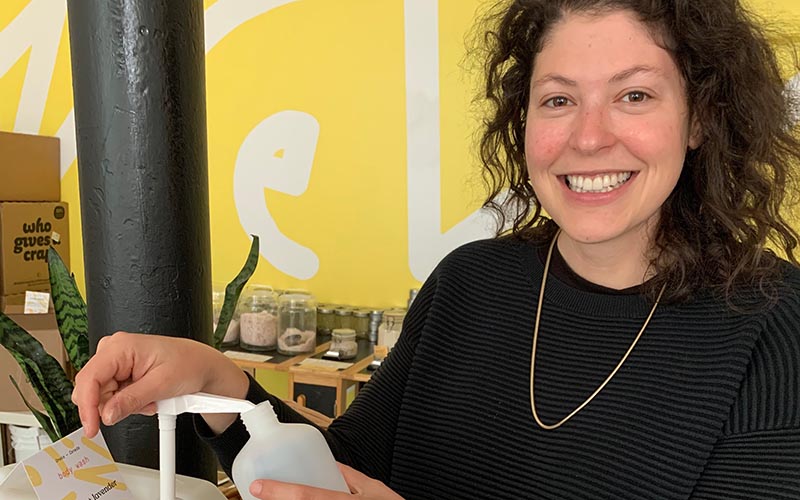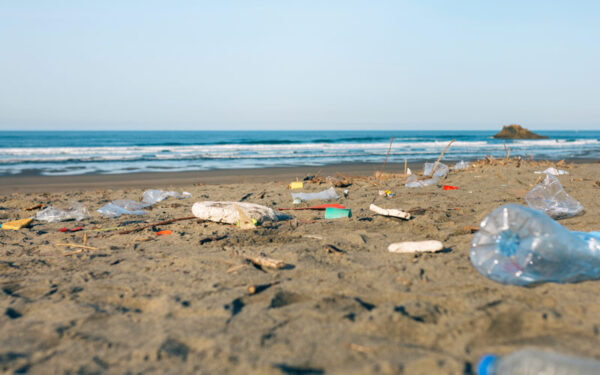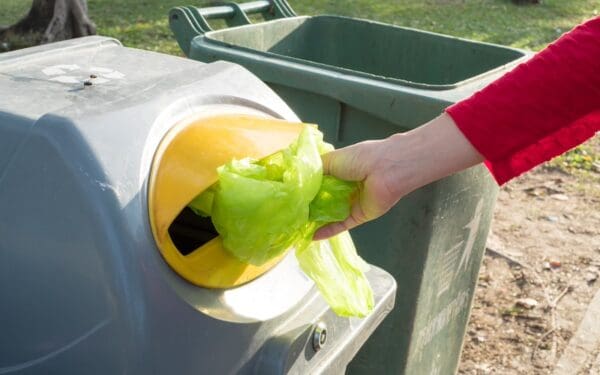
Pictured: Sarah Levy, owner of Cleenland, a low-waste personal and home care shop in Cambridge, MA. Photo: Provided by Sarah Levy
The owner of a new, low-waste, personal and home care store in Cambridge, MA, Sarah Levy has re-envisioned the way we shop while helping our community to reduce its waste.
For as long as I can remember, I’ve tried to use resources efficiently (i.e., not waste stuff), which is likely a result of growing up in a relatively frugal household. I’ve always reused sealable plastic bags and brought my own totes to the grocery store. I’ve even mastered the fridge-clean-out dinner.
But over the past few years, I’ve taken steps to up my low-waste game – steering clear of to-go coffee and food unless I have a container with me, and kissing a lot of plastic-wrapped foods goodbye – see you never, crackers.
Opting-in to Sustainable Practices: Hello Refillables
Even still, I am far from eliminating all the waste in my life. This is largely because most products and stores are designed to contribute to our waste stream in exchange for convenience, low immediate cost, and, above all else, the guarantee of continued consumption.
More recent strategies for lowering my personal waste involve removing everyday conveniences from my life, which I’ll admit isn’t that much fun. That’s why I was psyched to learn about the concept of a low-waste, refill shop – where visitors can repeatedly refill their own containers from the store’s bulk supply. I love being able to opt-in to sustainable practices, rather than opt-out of polluting ones – refilling is something we can do, instead of something we can’t.
Staying Clean and Reducing Waste
When I first started upping my low-waste game, I had no problem cutting out foods with absurd amounts of packaging. But it wasn’t as easy to give up shampoo, laundry detergent, and dish soap, despite the plastic bottles they came in. What made it even more difficult was that there were no low-waste stores in the Greater Boston area. So this past spring, I decided to open my own low-waste, personal and home care shop in Cambridge, Massachusetts – Cleenland.
The Journey to Opening a Low-Waste Shop
My journey towards launching Cleenland started with research on what low-waste personal and home care products were already out there. I found that some companies would sell me in bulk the products we use regularly — items like hand soap, shampoo, conditioner, lotion, laundry detergent, dish soap, counter spray, etc. Even better, one of these companies said I could return their five-gallon buckets to be refilled!
I also looked for other essential products that had been designed to be sustainable – based on the product’s packaging or its longevity and reusability. Here’s a smattering of the goods I found:
- Compostable silk dental floss in a glass vial dispenser
- Deodorant and lip balm formulated to be packaged in compostable cardboard tubes
- Super absorbent wood cellulose and cotton sponge cloths that can be machine-washed a couple hundred times before they fall apart – and then you can compost them
- Hand and body soap, shampoo, conditioner, and dish soap, all in bar form – no water, no bottle, no problem!
More Ways to Reuse
An even more resource-responsible option – rather than buying something new – is reusing what we already have. Since starting Cleenland, I’ve learned a lot of excellent ways we can reuse items or products. In addition to refilling soap bottles, here are a few suggestions:
- Cover a bowl of leftovers in the fridge with a plate – you can also use a beeswax wrap or a stretchy silicone cover
- Use fabric from an old t-shirt to create a produce bag. Better yet, consider placing those two red peppers directly into the basket – no bags needed.
- Stretch a few rubber bands over a mint tin to create a soap dish – keeping your shampoo bar dry so it lasts longer.
- When finishing up a jar of pickles or your favorite spaghetti sauce, keep the container and use it for leftovers or storage.
Refill Shops are the Future
The response to Cleenland has been amazing. Our community has already refilled more than 1,500 containers in just three months. Such positive results constantly have me thinking about the refill concept and how I can make it the default method when shopping for these items. I’m thrilled to be redesigning the shopping experience for personal and home care products and look forward to re-imagining how we balance our personal needs with those of our planetary home.
Make sure to stop by Cleenland when you’re in Cambridge and be on the look-out for low-waste and buy-in-bulk shops near you!




